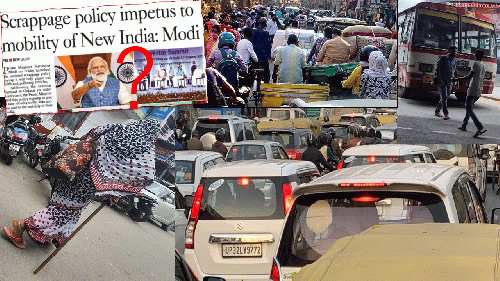� Here is the video: Click Here

Socially just and ecologically sustainable Public Transport system is the only hope for safer roads, protecting environment, and promoting circular economy
(Image by CNS) Details DMCA
If the goal is to protect environment from automobile pollution, improve road safety, and end economic disparities in the society, then vehicle scrappage policy is not likely to deliver on these tall promises. Rather such a policy could be counter-productive if we look closely at the aforementioned goals. Such a policy is another example of promoting market-based solutions to benefit few industries at the plight of the people and the planet. If governments are serious to deliver on the goals listed above, then the only way forward is to improve public transport to an extent that private ownership of motor vehicles, becomes unnecessary and cumbersome.
When Covid pandemic had peaked in India during April-May 2021, we may remember how some people who had resources procured oxygen cylinders as well as oxygen concentrators. But had the health system been strong enough for every human being, then why would have people privately procured such potentially lifesaving equipments like oxygen concentrators? Likewise if public transport is strong enough, then why will we own a private vehicle?
Last week Indian government announced its National Automobile Scrappage Policy at an investor summit to 'give a new identity to the auto sector and to the mobility of New India'. The government hopes that such a policy will inject over INR 100 billion. Indian Prime Minister said in a series of tweets that his aim is to create a viable circular economy and bring values for all while being environmentally responsible. He said that the goal for 21st century India is to be clean, congestion-free and convenient mobility is the need of the hour. He also mentioned market-based solutions such as promoting electric vehicles. But he did not mention even once the plight of public transport due to which people are forced to buy private vehicles (often on loans) to meet their commuting needs.
Car-less commuting is the future!
Who can disagree with the above promises the government is making, but such promises can only be delivered if we strive towards improving public transport with equity and human rights in the centre. Electric vehicles or scrappage policy alone cannot be magic bullet rather they can fuel the very crisis we are trying to mitigate. Replacing motor vehicles with electric vehicles is not the solution to meet the abovementioned goals, but transforming public transport so that car-less commuting becomes possible and feasible for rich and poor alike, can perhaps inch us closer towards these goals. After all, circular economy does not mean that money of the 99% 'have-nots' gets siphoned into the hands of the 1% of the most elite and rich people in the country.
We must remember that it is government's responsibility to provide safe, convenient, affordable, accessible and humane ways of commuting for all its citizens. Public transport has to be socially just and ecologically sustainable. For example, public transport should be within reach for everyone - specially including those who are often left behind - such as persons with disabilities, senior citizens, children, all genders, rich and poor alike, homeless people, and every human being on the planet!
When governments fail on its duty then it hides behind the market forces, and co-opts itself in corporate agenda, enticing citizens to own, borrow, rent and use private vehicles to commute. Forcing people to own their own motorized vehicle (two wheeler, car, etc) is one of the most normalized form of privatization where government like ours has almost washed away its hands from being responsible for strengthening the public transport system. We need to improve public transport to an extent that it becomes so good that no one needs a private vehicle anymore.
(Note: You can view every article as one long page if you sign up as an Advocate Member, or higher).





